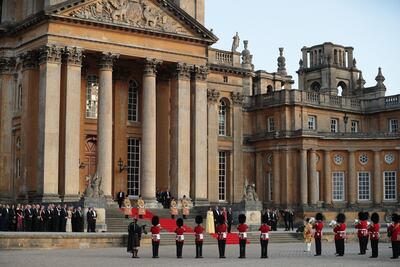British business is in two minds about Labour’s election landslide.
There is the fear of higher taxes and the feeling, whatever Keir Starmer and the Chancellor Rachel Reeves might say, that Labour would rather target UK business for more revenue than people.
Against that is the prospect of certainty, that after recent upheaval Britain is on a solid footing once again, with a strong government, which helps a firm’s planning for the future and capital investment.
There’s also the likelihood of a ‘reset’ with the EU, ironing out the worst wrinkles of Brexit, enabling smoother and easier movement of goods and people. Some hope that rejoining the bloc completely may be within sight.
What they see as the beginning of a new era starts this week with the meeting of the European Political Community at the stately Blenheim Palace in Oxfordshire. The brainchild of Emmanuel Macron, the EPC is open to all European leaders, not just EU.
This session will be the fourth such gathering since the French President felt that Europe needed to be able to meet and formulate a collective response to Russia’s invasion of Ukraine in February 2022.

The agenda is slight – it’s more an informal networking event and talking shop than sit-down debating forum. Starmer, the host, sees it as the perfect, early opportunity to reassert Britain’s position on the international stage and restore confidence after the self-inflicted isolationism of Brexit.
He will address the opening plenary session, held in one of the great halls of Blenheim, birthplace of Winston Churchill. His speech will play to Labour’s ‘twin-track’ approach to the EU, of closer security ties and boosting trade links.
It comes after Starmer’s new Minister for European Relations, Nick Thomas-Symonds, travelled to Brussels for an introductory meeting with the former Brexit negotiator, Maros Sefcovic. After too, the Irish Taoiseach, Simon Harris, promised to support Starmer’s UK on the European stage and ordered his ministers to develop closer contacts with their Labour opposite numbers.
Starmer is holding two bilaterals this week. One, with Harris at Chequers on Wednesday evening; the other with Macron at Blenheim on Thursday. There is palpable excitement in senior Labour circles and within the business community that EU relations are rapidly turning a corner and tangible outcomes are near.
Bad blood
They may be getting ahead of themselves. While the mood music from Brussels is positive, it is also couched. The description being repeated by EU officials is that they’re "open-minded" to seeing what can be achieved. That is not a ringing endorsement of a new relationship, it’s putting the ball firmly into Britain’s court, to show that Starmer is serious, that this different approach is genuine, deep and lasting.
There’s been too much bad blood, mostly emanating from the UK side, as they see it, for a sudden rapprochement.
Starmer may desire this, a body of the electorate want it and the bulk of British business certainly wishes for change. But there is still the figure of Nigel Farage, someone ingrained on the minds of Brussels servants, who for years abused and insulted them and their institution, with which to contend. They do not forget easily.
The success of Farage’s Reform party in the election illustrated there is still a considerable rump of UK opinion that has not diminished.
What the EU would like is for the UK to offer proof of willingness. As a first step they’re looking for an agreement for greater mobility of younger people between the UK and EU, for each other's citizens to come and go, and be able to settle and work freely. They also wish for the rebirth of the Erasmus youth scholarship programme.
A test for Starmer
These are chosen deliberately; in the belief they will contribute to the UK’s youth achieving a better understanding and appreciation of the EU. They also, though, go to the heart of immigration policy and are likely to inflame Farage and his supporters.
It’s a test, to see how intentioned Starmer really is and whether he can command popular support. Get that right, they’re saying, and other reforms may materialise.
They also stress, however, that foremost in their minds is not the UK. It’s Ukraine and Russia and security. That, after all, is what the EPC was set up to explore. At the top of the priority list this week is defence and democracy, and two working groups have been set up to capture current thinking. Ukraine’s President Volodymyr Zelenskyy is expected to attend.
China, and the new power axis it has with Russia and India, are other causes for concern. Then there is the possibility of a Trump second term. There is much for the Europeans to be anxious about, not just Britain’s future dealings with the EU.
Migration is another hot topic. Here, they are seeking a shift from the UK. Rishi Sunak’s plan to relocate illegal immigrants in Rwanda was met by scorn in Brussels. They are hoping for a signal from Starmer that Sunak’s scheme is dead and buried.
EU officials emphasise as well that the EU and its chiefs are exhausted. Britain may have been in the midst of a change of leadership but there is barely an EU country without some serious, pressing domestic issue. Macron himself arrives as a reduced President, combating turmoil that ironically, was down to his doing, at home.
This EPC summit comes, too, after numerous other similar gatherings and the criss-crossing of the world. It was meant to be sooner but was delayed by Sunak. Most of those present will be contemplating August and the respite of the beach. Where the UK belongs in their firmament will not dominate their thoughts.
Patience and one step at a time will be the message. As for the ultimate goal for some, of rejoining, at a recent lunch with a senior Brussels bureaucrat, I was left in no doubt that there was little to no chance of that happening, not any time soon, if at all.

Readmission would require the approval of all the member countries and he was confident obtaining unanimous agreement would prove impossible.
We, in London, underestimate, he said, the suspicion giving way to actual hostility that exists in some European capitals. We don’t have an automatic right of re-entry; we must learn to shed our historic sense of entitlement.
Blenheim might be where Winston Churchill, the great European liberator, was born but the palace was originally conceived by a grateful nation as a reward to John Churchill, 1st Duke of Marlborough, for his military endeavours against the French and Germans. The fragile nature of UK-European relations will not be lost on anyone.


